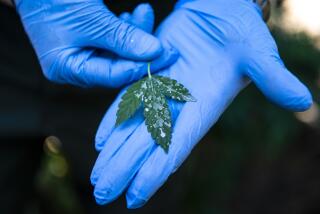The DEA’s marijuana mistake
For a muscular agency that combats vicious drug criminals, the U.S. Drug Enforcement Administration acts like a terrified and obstinate toddler when it comes to basic science. For years, the DEA and the National Institute for Drug Abuse have made it all but impossible to develop a robust body of research on the medical uses of marijuana.
A pro-marijuana group lost its legal battle this week when a federal appellate court ruled that marijuana would remain a Schedule I drug, defined as having no accepted medical value and a high potential for abuse. The court deferred to the judgment of federal authorities, quoting the DEA’s statement that “the effectiveness of a drug must be established in well-controlled, well-designed, well-conducted and well-documented scientific studies.... To date, such studies have not been performed.”
But guess who bears responsibility for this level of ignorance? The DEA itself, which through its ultra-tight restrictions on marijuana has made it nearly impossible for researchers to obtain the drug for study, and the National Institute for Drug Abuse, which controls the availability of the tiny quantity of research-grade marijuana that is federally approved for production.
The few, smaller studies conducted so far suggest marijuana has promise as a medicine, but they’re far from conclusive. The National Cancer Institute and the Institute of Medicine support further research.
The judges had it right: In the absence of scientific evidence, they are not in a position to make medical decisions for the country or to set research priorities for the U.S. government. But the Obama administration can and should put the dark ages of uninformed fear behind us and release the death grip of the DEA and the National Institute for Drug Abuse on research-grade marijuana. President Obama then should direct the National Institutes of Health to fund worthwhile research, just as he recently ordered the U.S. Centers for Disease Control and Prevention to research gun violence.
Eighteen states and Washington, D.C., have medical marijuana laws, and last year voters in Colorado and Washington legalized recreational marijuana to a limited extent. As a result, the president has expressed willingness to consider decriminalizing possession of small quantities under federal law. That’s fine as far as it goes, but it doesn’t address the need for legitimate research. Do the reports of relief from various ailments reflect real medical results or a placebo effect? Is marijuana perhaps as useful as other, more dangerous drugs — morphine and cocaine, for example — that already can be legally prescribed?
Marijuana is just another drug, no more, no less. The nation should treat it that way by evaluating the facts and the science instead of hiding behind myths and rumors.
More to Read
A cure for the common opinion
Get thought-provoking perspectives with our weekly newsletter.
You may occasionally receive promotional content from the Los Angeles Times.










